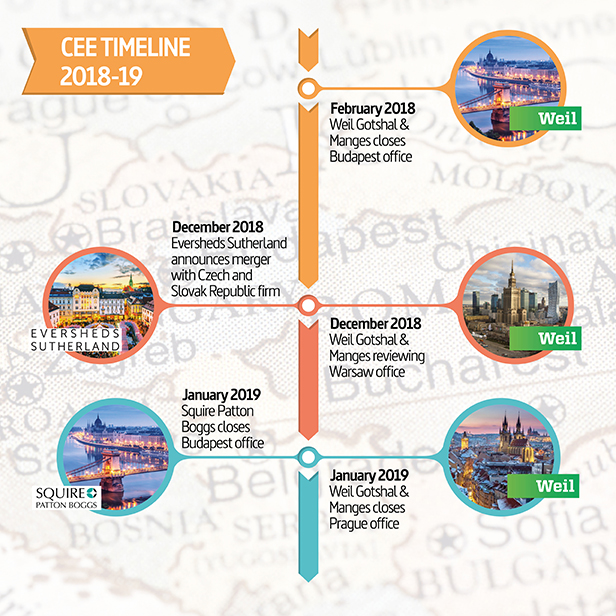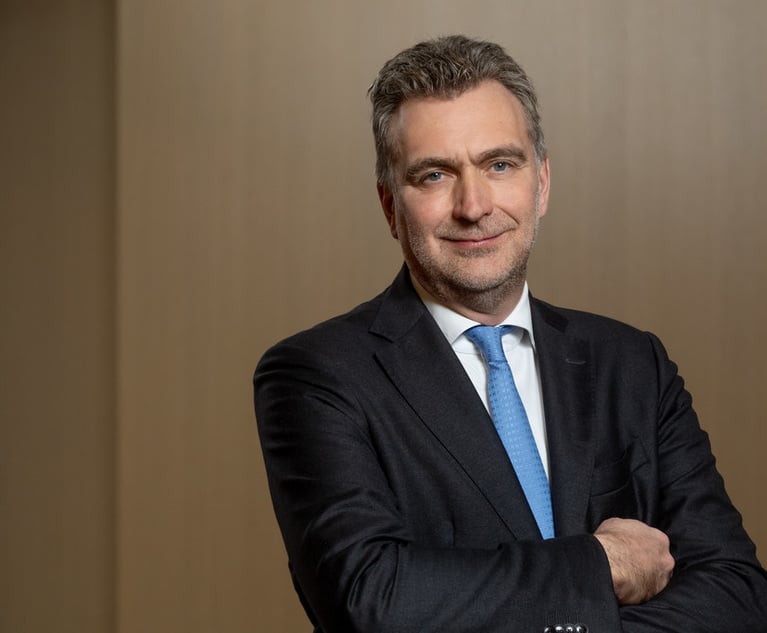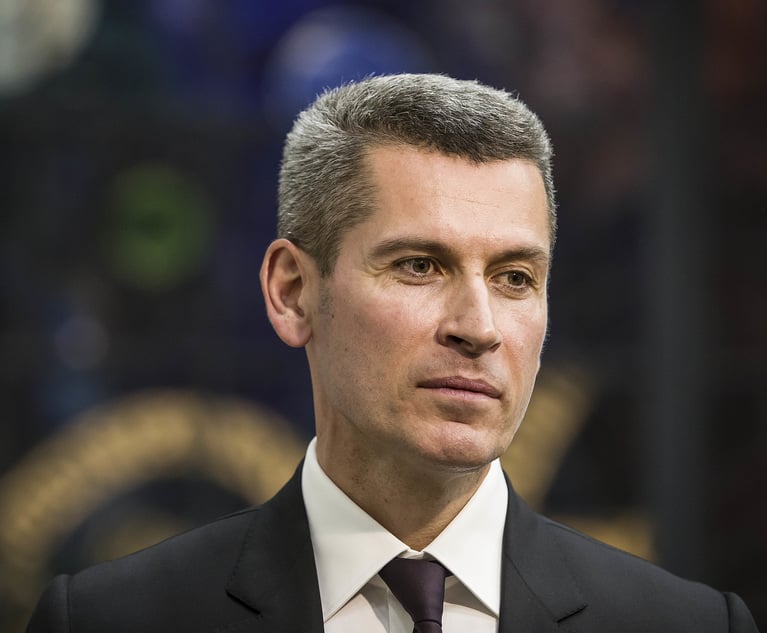Global Firms Back Away from Eastern Europe
Law firms are rethinking their approach to the former Soviet Bloc, once a boom region in the wake of the fall of the Berlin Wall.
March 18, 2019 at 04:00 AM
8 minute read
Central and Eastern Europe (CEE), once a boom region for the legal industry, is now suffering from political uncertainty, a glut of lawyers and fierce competition that is squeezing charge-out rates and profit margins.
In the past year, Weil Gotshal & Manges has closed its offices in Budapest and Prague and placed the future of its Warsaw operation under review, while Squire Patton Boggs has pulled the plug on Budapest.
It follows a number of firms reassessing their presence in the region. Hogan Lovells, Norton Rose Fulbright, Weil, Squire, Clifford Chance, Linklaters, Freshfields Bruckhaus Deringer and Allen & Overy all launched their CEE bases in the 1990s or early 2000s. But Linklaters pulled out of four of its six CEE bases in 2008, and in 2009 Clifford Chance pulled out of Budapest and Freshfields pulled out of Bratislava – its only CEE base outside of Vienna and Moscow. In 2014, Hogan Lovells and Norton Rose both pulled the plug on their Czech Republic offices. And since then, Weil and Squire have followed this trend.
Following the moves by Weil and Squire, rumours are now circulating over the future commitment of other law firms to the region, which has an overpopulated legal structure that is now making it much less appealing to international firms.
 Click on the timeline for an interactive version with further links
Click on the timeline for an interactive version with further linksOne partner in a CEE firm, who asked not to be named, says the region went through a boom in the 1990s as the former Soviet Bloc embraced the free market in the wake of the collapse of the Berlin Wall.
He says that in 1995, 55 law firms were listed as wanting to set up offices in Hungary – the country thought of as the gateway to the CEE.
But investors took a step back after the 2008 economic crisis and the arrival of nationalistic populism ushered in by the government of former professional football player Viktor Orban in 2010.
"The love affair was over," the partner says.
The economy has since evened out from the crisis and has built-in legal activity, but remains a difficult market for some international law firms. More recent political turmoil spilling over into the CEE from Russia has added to the tensions.
And now, firms pulling out of the region show that the CEE has not sprung back to where some firms would like it to be, or at least not for the strategies they operate under.
Rates are 'significantly lower'
Bird & Bird commercial partner Tomasz Zalewski says the lawyer head count in the CEE has grown by the thousands in the past couple of years, and still the market is getting a considerable in-flow of qualified lawyers, yet the charge-out rates are "significantly lower" than other regions.
"International firms are more eager to cut rates very deeply – to keep lawyers busy"
He says fierce competition means even the big international firms have had to lower their prices.
Soltysinski Kawecki & Szlezak partner Rudolf Ostrihansky, when interviewed in 2014, said the international firms were struggling to gain work in dispute resolution or litigation, with most work going to independent firms.
This meant international firms were lowering their rates: "International firms are more eager to cut rates very deeply – to keep lawyers busy," he said.
Data from Mergermarket shows that deal value has dropped considerably since 2010. In 2010, the largest deal value was €22 billion ($24.9 billion), which increased to a peak at €54 billion ($61.2 billion) in 2012. This value then decreased significantly since then, standing at €7 billion ($7.9 billion) in 2018. As a comparison, Italy's largest deal value in 2018 was €45 billion ($51 billion), Germany's was €91 billion ($103.2 billion), France's was €34 billion ($38.6 billion), and Ireland's was €72 billion ($81.6 billion).
Three different models
One White & Case partner in the CEE says he sees three types of firms in the region: local firms, then two styles of international firms.
"If you have a fully integrated network in CEE with a global brand, you can benefit from international clients while having the benefit of international management.
"But if you are a more detached office of an international firm, in which you're part of a network but the network isn't really focused on the CEE or Europe, then you will struggle; you have neither the flexibility of the local firms, nor the support from your international brand," he says.
"The mid-ground firms will suffer, while the big international firms will remain strong"
The partner points out that magic circle firms and some U.S. firms are successful because they have such a strong European integrated footprint, but others – like Weil Gotshal & Manges – do not.
One ex-Weil partner says he suspects the firm's closure of the Prague office was due to it struggling with insufficient local rates, making it a much less profitable office and that the office lead partner was keen to go independent, to work with his local clients without interference from Weil's international managing body.
The White & Case partner says he expects local Polish firms to grow stronger, and for the chasm between the two types of international firms to grow even wider: "The mid-ground firms will suffer, while the big international firms will remain strong."
Poles apart
Despite some office closures in Warsaw, Poland is regarded as unique to the CEE region, with a much larger economy.
Despite closing many of its CEE operations in 2008, Linklaters kept its presence in Moscow and Warsaw. And since then, other law firms have shown continued commitment to Poland despite exiting neighbouring CEE countries.
However, this year is an election year for Poland. The White & Case partner says that with an election, there are always going to be question marks over transaction and investment work and whether these might be postponed.
Bird & Bird's Zalewski says that while the Polish economy is growing, and more businesses in the region are going international – meaning more work is opened up for international law firms – the different approaches of law firms can be the differentiating factor.
"The elections add to the anxieties"
He says that because the market is dominated by public or state-owned businesses, choosing a client that is in opposition to one of the state-owned businesses can cut you off from getting work on government contracts: "And the elections can add to these anxieties."
The practice areas chosen by law firms on which to focus can also affect the stability of their CEE work.
Bird & Bird Budapest managing partner David Dederick says there has been "diversification of practices" in Hungary by many international law firms.
"When they first arrived in the region, international firms were focused on privatisations and foreign investment projects," he says. "Over the years, the firms that have remained have moved towards other practice areas such as litigation, regulatory, and banking and finance."
And he highlights that the interest of foreign investors in Hungary is more "nuanced" now. He says there continues to be strong interest from investors such as automobile manufacturers and suppliers, and multinational shared service centre operations, but less interest among others, such as global private equity firms due to the lack of sizeable deals.
Some survivors
Dederick says the office closures have led to a new trend among law firms – what he calls the "leave behind operations". He says that after many international firms have pulled out of the region, the local lawyers have continued to operate, but as independent law offices that can effectively compete with international firms.
The increased success of these smaller independents supports the characterisation that the CEE does not necessarily fit within the network of many international firms.
And yet some international firms are still standing strong: the market is still beneficial for firms that have CEE offices in addition to a large network of other European offices.
Zalewski says that he believes Bird & Bird was so successful because it managed as "one firm." And with Bird & Bird focusing on technology that is flourishing in the region, the casualties have been among the firms choosing work that may present a potential conflict between the local state businesses and the international clients, or those specialising in M&A or other financial areas, which have both been shrinking.
This content has been archived. It is available through our partners, LexisNexis® and Bloomberg Law.
To view this content, please continue to their sites.
Not a Lexis Subscriber?
Subscribe Now
Not a Bloomberg Law Subscriber?
Subscribe Now
NOT FOR REPRINT
© 2025 ALM Global, LLC, All Rights Reserved. Request academic re-use from www.copyright.com. All other uses, submit a request to [email protected]. For more information visit Asset & Logo Licensing.
You Might Like
View All

Jones Day, BCLP & Other Major Firms Boost European Teams with Key Partner Hires
4 minute read
$13.8 Billion Magomedov Claim Thrown Out by UK High Court
Trending Stories
- 1South Florida Attorney Charged With Aggravated Battery After Incident in Prime Rib Line
- 2'A Death Sentence for TikTok'?: Litigators and Experts Weigh Impact of Potential Ban on Creators and Data Privacy
- 3Bribery Case Against Former Lt. Gov. Brian Benjamin Is Dropped
- 4‘Extremely Disturbing’: AI Firms Face Class Action by ‘Taskers’ Exposed to Traumatic Content
- 5State Appeals Court Revives BraunHagey Lawsuit Alleging $4.2M Unlawful Wire to China
Who Got The Work
J. Brugh Lower of Gibbons has entered an appearance for industrial equipment supplier Devco Corporation in a pending trademark infringement lawsuit. The suit, accusing the defendant of selling knock-off Graco products, was filed Dec. 18 in New Jersey District Court by Rivkin Radler on behalf of Graco Inc. and Graco Minnesota. The case, assigned to U.S. District Judge Zahid N. Quraishi, is 3:24-cv-11294, Graco Inc. et al v. Devco Corporation.
Who Got The Work
Rebecca Maller-Stein and Kent A. Yalowitz of Arnold & Porter Kaye Scholer have entered their appearances for Hanaco Venture Capital and its executives, Lior Prosor and David Frankel, in a pending securities lawsuit. The action, filed on Dec. 24 in New York Southern District Court by Zell, Aron & Co. on behalf of Goldeneye Advisors, accuses the defendants of negligently and fraudulently managing the plaintiff's $1 million investment. The case, assigned to U.S. District Judge Vernon S. Broderick, is 1:24-cv-09918, Goldeneye Advisors, LLC v. Hanaco Venture Capital, Ltd. et al.
Who Got The Work
Attorneys from A&O Shearman has stepped in as defense counsel for Toronto-Dominion Bank and other defendants in a pending securities class action. The suit, filed Dec. 11 in New York Southern District Court by Bleichmar Fonti & Auld, accuses the defendants of concealing the bank's 'pervasive' deficiencies in regards to its compliance with the Bank Secrecy Act and the quality of its anti-money laundering controls. The case, assigned to U.S. District Judge Arun Subramanian, is 1:24-cv-09445, Gonzalez v. The Toronto-Dominion Bank et al.
Who Got The Work
Crown Castle International, a Pennsylvania company providing shared communications infrastructure, has turned to Luke D. Wolf of Gordon Rees Scully Mansukhani to fend off a pending breach-of-contract lawsuit. The court action, filed Nov. 25 in Michigan Eastern District Court by Hooper Hathaway PC on behalf of The Town Residences LLC, accuses Crown Castle of failing to transfer approximately $30,000 in utility payments from T-Mobile in breach of a roof-top lease and assignment agreement. The case, assigned to U.S. District Judge Susan K. Declercq, is 2:24-cv-13131, The Town Residences LLC v. T-Mobile US, Inc. et al.
Who Got The Work
Wilfred P. Coronato and Daniel M. Schwartz of McCarter & English have stepped in as defense counsel to Electrolux Home Products Inc. in a pending product liability lawsuit. The court action, filed Nov. 26 in New York Eastern District Court by Poulos Lopiccolo PC and Nagel Rice LLP on behalf of David Stern, alleges that the defendant's refrigerators’ drawers and shelving repeatedly break and fall apart within months after purchase. The case, assigned to U.S. District Judge Joan M. Azrack, is 2:24-cv-08204, Stern v. Electrolux Home Products, Inc.
Featured Firms
Law Offices of Gary Martin Hays & Associates, P.C.
(470) 294-1674
Law Offices of Mark E. Salomone
(857) 444-6468
Smith & Hassler
(713) 739-1250










